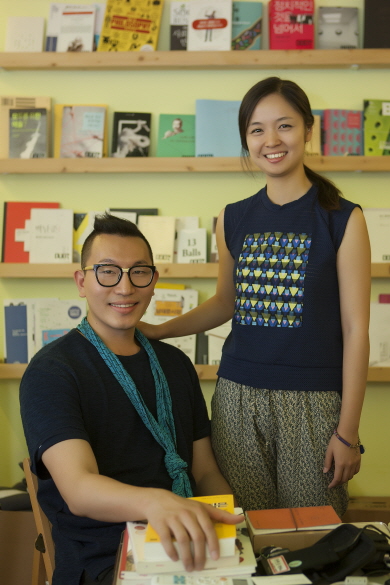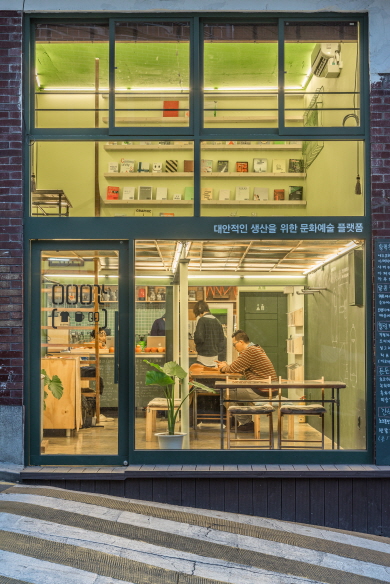
When you get off the bus at the three-way intersection at Naksan Park and follow one of the steep alleys, you can easily spot the bustling sewing factories on both sides. An old hub of Korean garment industry, Changsin-dong is recovering its reputation in collaboration with young artists. These young creative artists are from “000gan,” a social enterprise that aims to promote benefits through a new form of design process.
Hong Seong-jae, who established 000gan in 2012, was once a student who studied fine arts at Hongik University and dreamed of a life gaining reputation through his artworks. However, he soon realized that he was trapped in a circle of harsh reality. He had to earn money to pursue his career, and this in turn did not allow him to spend time for his artwork. By the time this reality hit him hard, he joined a business that supports arts and cultural activities, Mecenat, to teach art at a community child center in Changsin-dong, central Seoul.
“When I was at the community child center, I had time to talk with the teachers there and the children’s parents who were mostly merchants working in the sewing factories,” Hong said.
As he spent more time with them, Hong came to know more about the underlying problems of these sewing factories. What had once been the center of Korean garment industry had lost its vitality after a massive influx of cheap products from large foreign brands which dominated the local market.
“Areas that seem to be stagnant can regain their vitality and stand on their own if they only have a self-sufficient system,” Hong said.
When 000gan first settled in Changsin-dong, working with the people at the district, Hong strived to find a realizable and adaptable solution on how to make a self-sufficient system suitable for Changsin-dong.
One of the biggest problems at the town was the large amount of leftover fabrics. Before 000gan settled, more than 20 tons of leftover materials were thrown away every day at Changsin-dong. Realizing this, 000gan decided to design clothes in a way that can minimize the leftovers, cutting down the waste to five percent. Their “zero waste” clothes are now on sale at department stores and are starting to become popular among young people.

Staffed with many young artists, 000gan is in charge of design, which requires creative ideas, while sewing factories are in charge of the manufacturing part. The profit of their revenue is shared equally, which is a high profit share for the merchants compared to other clothing companies.
“I wanted to have a horizontal relationship with the residents in which we complement each other,” Hong emphasized.
Members of 000gan are trying projects in new fields as their name 000gan, implies. The zeros stand for empty spaces waiting to be filled in with new ideas beyond what 000gan has already been doing.
Its projects also focus on programs that provide chances for people to become self-sufficient, which reflects Hong’s original intention of having a business that can stand on its own. They have held an education program, “design village camp,” where youths can come up with their own sustainable works. They also have participated in creative experimental activities in schools in Siheung to teach up-cycling.
Now in their fourth year of business, 000gan is preparing to take on a new challenge. For the first time, they have been invited to Maison & Objet Paris, which is an international trade fair dedicated to lifestyle fashions and trends where professionals from different backgrounds come together. From a youth who had once been frustrated by the harsh reality of business to a successful CEO, Hong has made his own way to do things he has fallen love with.
“I understand that getting a decent job and doing the work one wants is not an easy task nowadays,” Hong remarked. “Instead of struggling within a crowded marketplace, it is important to come up with a new platform of your own to show the world.”

